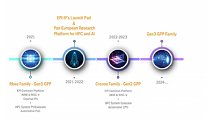Raevenlord
News Editor
- Joined
- Aug 12, 2016
- Messages
- 3,755 (1.22/day)
- Location
- Portugal
| System Name | The Ryzening |
|---|---|
| Processor | AMD Ryzen 9 5900X |
| Motherboard | MSI X570 MAG TOMAHAWK |
| Cooling | Lian Li Galahad 360mm AIO |
| Memory | 32 GB G.Skill Trident Z F4-3733 (4x 8 GB) |
| Video Card(s) | Gigabyte RTX 3070 Ti |
| Storage | Boot: Transcend MTE220S 2TB, Kintson A2000 1TB, Seagate Firewolf Pro 14 TB |
| Display(s) | Acer Nitro VG270UP (1440p 144 Hz IPS) |
| Case | Lian Li O11DX Dynamic White |
| Audio Device(s) | iFi Audio Zen DAC |
| Power Supply | Seasonic Focus+ 750 W |
| Mouse | Cooler Master Masterkeys Lite L |
| Keyboard | Cooler Master Masterkeys Lite L |
| Software | Windows 10 x64 |
The European Processor Initiative(EPI), crucial element of the European exascale strategy, delivers its first architectural design to the European Commission and welcomes new partners Almost six months in, the project that kicked off last December has already delivered its first architectural designs to the European Commission, thus marking initial milestones successfully executed. The project that will be the cornerstone of the EU's strategic plans in HPC initially brought together 23 partners from 10 European countries, but has now welcomed three more strong additions to its EPI family. EPI consortium aims to bring a low-power microprocessor to the market and ensure that the key competences for high-end chip design remain in Europe. The European Union's Horizon 2020 program funds this project with a special Framework Partnership Agreement. The initial stage is a three-year Specific Grant Agreement, which lasts until November 2021.

The EPI consortium includes experts in all the relevant areas for such a major undertaking: the High-Performance Computing research community, major supercomputing centers, the computer system, automotive, and silicon industry, as well as the potential scientific and industrial users. Through a co-design approach, EPI will design and develop the first European HPC System for the HPC and automotive markets through several major streams of operation:
The Initiative is part of a broader strategy implemented by the European Union via its legal and funding entity -the Euro HPC Joint Undertaking (JU). The JU will enable pooling of the Union's and national resources on HPC to acquire, build, and deploy in Europe the most powerful supercomputers worldwide. EPI is one of the cornerstones of this EU HPC strategic plan. Drawing on the expertise of the partners in the consortium, EPI aims to bring a low-power microprocessor to market. It will ensure that the key competence of high-end chip and system design remains in Europe, a critical requirement for many application areas.
Thanks to such new European-developed technologies, European researchers from academia and industry will be able to access HPC systems at exceptional levels of energy-efficient performance. As recognized by high-level EU officials, EPI will contribute to Europe's scientific leadership, industrial competitiveness, engineering skills and know-how - not to mention society as a whole.

"European Processor Initiative will deliver key technologies to the new European HPC strategic plan for an independent and innovative European high-performance computing and data ecosystem. Energy efficient high-performance families of EPI processors will include most advanced general-purpose and accelerator cores that will deliver unprecedented processing capabilities, enabling EU researchers from academia and industry to most efficiently address global challenges. The business sustainability of the initiative is supported by carefully balanced target markets, with primary focus on exascale HPC/AI and automotive markets," said Jean-Marc Denis, EPI Chairman of the Board.
"It is a privilege to lead this consortium and enable the creation of a new big player in the field of advanced semiconductors in Europe. We have the best teams, and a huge portfolio of expertise on board from deep node submicron, co-Design, computer science, to HPC, and automotive end-products. We expect to ship from 2021 our 1st high class and high-performance solution,"said Philippe Notton, General Manager of EPI.
"Acceleration is crucial to continued performance gains while reducing power consumption in computing. In EPI, the first accelerator will begin from RISC-V technology to deliver two unique vector and artificial intelligence accelerators for HPC and AI, since future supercomputers will be mostly heterogeneous; the second accelerator, based on Kalray's IP, will lead the path to deterministic automotive computation. Both are offering a European solution to future global converged (HPC and AI) computing needs," said Professor Mateo Valero, Director of Barcelona Supercomputing Center.
"The combination of general-purpose processors, hardware accelerators, security modules, and further IP modules on a system-on-chip is one of the key success factors for realizing a high-performant and energy-efficient automotive computing platform forautonomous driving and connected mobility", said Matthias Traub, manager of electric/electronic architecture at BMW Group Research.
EPI will use a holistic approach to refine the system architecture and its component specifications. All aspects of the solution, and their interactions, will be considered and tackled simultaneously, taking a co-design approach:
This approach will allow the consortium to meet the following goals:
One specific objective for the automotive sector is to develop customized processors able to meet the performance needed for autonomous cars.
EPI plans to deliver two generations of processorfamilies,with future families to follow. The architectural design of EPI processor families will ensure thatindividual processors address requirements specific toa particular market segment.
View at TechPowerUp Main Site

The EPI consortium includes experts in all the relevant areas for such a major undertaking: the High-Performance Computing research community, major supercomputing centers, the computer system, automotive, and silicon industry, as well as the potential scientific and industrial users. Through a co-design approach, EPI will design and develop the first European HPC System for the HPC and automotive markets through several major streams of operation:
- HPC general purpose processor
- Accelerator
- Automotive platform
The Initiative is part of a broader strategy implemented by the European Union via its legal and funding entity -the Euro HPC Joint Undertaking (JU). The JU will enable pooling of the Union's and national resources on HPC to acquire, build, and deploy in Europe the most powerful supercomputers worldwide. EPI is one of the cornerstones of this EU HPC strategic plan. Drawing on the expertise of the partners in the consortium, EPI aims to bring a low-power microprocessor to market. It will ensure that the key competence of high-end chip and system design remains in Europe, a critical requirement for many application areas.
Thanks to such new European-developed technologies, European researchers from academia and industry will be able to access HPC systems at exceptional levels of energy-efficient performance. As recognized by high-level EU officials, EPI will contribute to Europe's scientific leadership, industrial competitiveness, engineering skills and know-how - not to mention society as a whole.

"European Processor Initiative will deliver key technologies to the new European HPC strategic plan for an independent and innovative European high-performance computing and data ecosystem. Energy efficient high-performance families of EPI processors will include most advanced general-purpose and accelerator cores that will deliver unprecedented processing capabilities, enabling EU researchers from academia and industry to most efficiently address global challenges. The business sustainability of the initiative is supported by carefully balanced target markets, with primary focus on exascale HPC/AI and automotive markets," said Jean-Marc Denis, EPI Chairman of the Board.
"It is a privilege to lead this consortium and enable the creation of a new big player in the field of advanced semiconductors in Europe. We have the best teams, and a huge portfolio of expertise on board from deep node submicron, co-Design, computer science, to HPC, and automotive end-products. We expect to ship from 2021 our 1st high class and high-performance solution,"said Philippe Notton, General Manager of EPI.
"Acceleration is crucial to continued performance gains while reducing power consumption in computing. In EPI, the first accelerator will begin from RISC-V technology to deliver two unique vector and artificial intelligence accelerators for HPC and AI, since future supercomputers will be mostly heterogeneous; the second accelerator, based on Kalray's IP, will lead the path to deterministic automotive computation. Both are offering a European solution to future global converged (HPC and AI) computing needs," said Professor Mateo Valero, Director of Barcelona Supercomputing Center.
"The combination of general-purpose processors, hardware accelerators, security modules, and further IP modules on a system-on-chip is one of the key success factors for realizing a high-performant and energy-efficient automotive computing platform forautonomous driving and connected mobility", said Matthias Traub, manager of electric/electronic architecture at BMW Group Research.
EPI will use a holistic approach to refine the system architecture and its component specifications. All aspects of the solution, and their interactions, will be considered and tackled simultaneously, taking a co-design approach:
- hardware platform architecture and components
- system and runtime software (OS, middleware, developers kit, compilers and libraries, etc.)
- HPC end-user applications
This approach will allow the consortium to meet the following goals:
- developing low-power microprocessor technology to be tentatively included in a European pre-exascale and subsequently exascale systems
- guaranteeing that a significant part of that technology is European
- ensuring that the application areas of the technology are not limited only to HPC, but cover other areas such as the automotive sector and the data centers, thus ensuring the overall economic viability of the initiative.
One specific objective for the automotive sector is to develop customized processors able to meet the performance needed for autonomous cars.
EPI plans to deliver two generations of processorfamilies,with future families to follow. The architectural design of EPI processor families will ensure thatindividual processors address requirements specific toa particular market segment.
View at TechPowerUp Main Site







